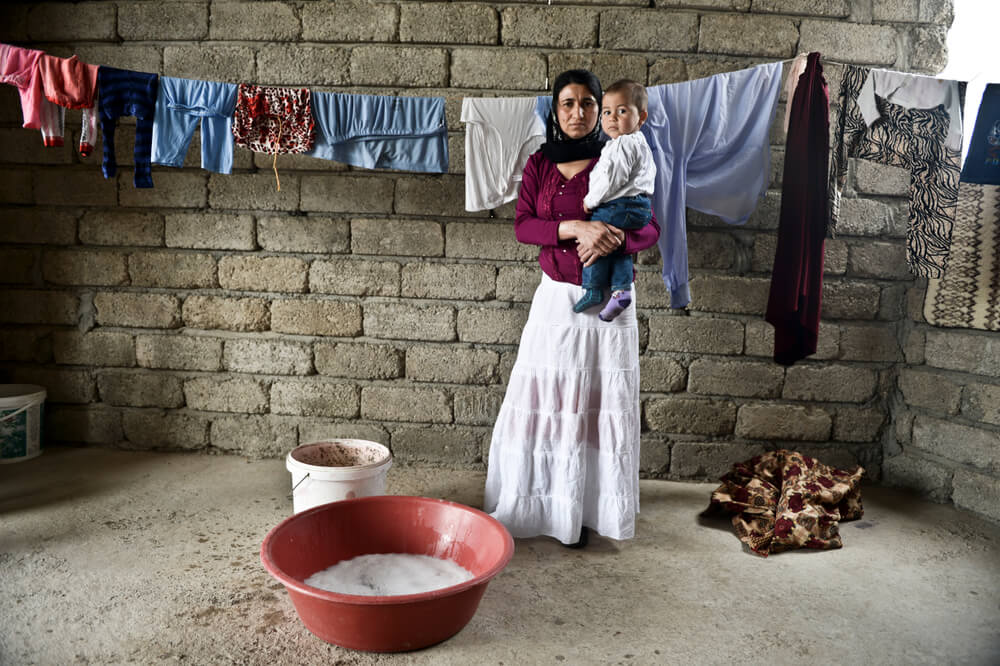It is hard to imagine up to 1.5 million people taking to the streets of London over the fate of Iraq as they did 22 years ago on 15 February 2003 to protest against the US-led invasion of Iraq. The country’s fate and development - or lack of it - is now barely mentioned as Western liberals focus on Gaza.
Under President Donald Trump, the US wants Iraq to take action against Iran-linked paramilitary groups as part of his “maximum pressure” policy to curtail Tehran’s nuclear and regional ambitions.
But as with so many of Trump’s recent announcements, there are many inherent contradictions that have yet to be resolved, even if that were possible.
In the case of Iraq, some of the Iran-backed groups that make up the Popular Mobilisation Forces (PMF) were US allies of convenience and not only helped to end Islamic State’s occupation of swathes of Iraq between 2014 and 2017, they are currently needed to ensure security on Iraq’s 372-mile border with Syria, where Islamic State remains a potent threat.
The Islamic State is adapting its modus operandi
Baghdad is walking a tightrope between the US and Iran, which is keen to maintain its close political and religious ties with Iraq, particularly after the severe weakening of its regional position following the fall of its ally Bashar Al-Assad in Syria and Israel’s military blow against its client Hezbollah in Lebanon.
In response to the rapidly shifting landscape, the Islamic State remains resilient and is adapting its “modus operandi” in Syria, according to Vladimir Voronkov, head of the UN’s counter-terrorism office.
Iraq is continuing to build a 300-kilometre wall in Anbar province on the Syrian border
Syria’s volatile situation is of concern, ”especially as there is a risk that stockpiles of advanced weapons could fall into the hands of terrorists,” he told the Security Council on 10 February.
In response to the threat, Iraq is continuing to build a 300-kilometre wall in Anbar province on the Syrian border and implementing additional measures, including trenches and surveillance systems. But at the same time, some Iraqis are urging normalisation of relations with Syria and opening the border for trade and tourism.
A US-Iraqi agreement may be delayed
This is controversial in Baghdad because Ahmed al-Sharaa, Syria’s new leader, was a member of Al-Qaeda in Iraq after the 2003 US-led invasion. While the US has revoked a $10 million bounty on him, Iraq has been much more cautious, and it still has an outstanding arrest warrant for him, according to local media reports.
Al-Sharaa has denied involvement in sectarian fighting in Iraq and said that his group, Hayat Tahrir al-Sham, has severed ties with Al-Qaeda.
“As a matter of principle, it is untenable for the Iraqi government to accept the new Syrian leader Ahmed al-Sharaa, who, under the nom de guerre Abu Mohammad al-Jolani, ran atrocious terrorist operations in Iraq for many years and was responsible for the killing of numerous innocent Iraqi civilians,” wrote Abbas Kadhim of the Atlantic Council think-tank.
Political and armed factions linked to Iran - which had been vociferous in their calls for US forces to leave Iraq - are now reconsidering their stance given the rising Islamic State threat
Much will hinge on whether the Trump administration retains US support for the Kurdish Syrian Democratic Forces in Syria, where the group oversees several camps holding thousands of Islamic State detainees and their families. Many of them are Iraqi.
Meanwhile, a US-Iraqi agreement to wind down the two-decade-long US military mission in Iraq by this September may be delayed if some Iraqis have their way. Political and armed factions linked to Iran - which had been vociferous in their calls for US forces to leave Iraq - are now reconsidering their stance given the rising Islamic State threat.
“Most leaders of the Shiite Coordination Framework are in favour of keeping American forces in Iraq and will not want American forces to leave Iraq as a result of what happened in Syria,” an official with the Iraqi group of Iran-allied political parties told the AP. “They are afraid of ISIS exploiting the vacuum if the Americans leave Iraq and the situation in Iraq collapses.”
Project shutdowns
Trump’s withdrawal from engagement with many global bodies is already affecting work in Iraq, with Yazidis who suffered a genocide under the Islamic State and with Christian minorities who suffered horrific persecution.
A cutoff in funds to USAID that provided much of the humanitarian funding in the Yazidi town of Sinjar has already led to project shutdowns, such as those providing electricity and other much-needed infrastructure.
 A cutoff in funds to USAID that provided much of the humanitarian funding in the Yazidi town of Sinjar has already led to project shutdowns, such as those providing electricity and other much-needed infrastructure
A cutoff in funds to USAID that provided much of the humanitarian funding in the Yazidi town of Sinjar has already led to project shutdowns, such as those providing electricity and other much-needed infrastructure
Former American officials are pointing out the hypocrisy of the Trump administration. “This week at the International Religious Freedom Summit, Vice-President JD Vance declared that he and the president were committed to promoting religious freedom worldwide as both an American and Christian value,” wrote Adam Nicholas Phillips, a former USAID official under former President Joe Biden.
“So it was perplexing to hear the vice president champion these initiatives while, at the same time, funds for efforts like these are literally being turned off,” he wrote.
Only a couple of weeks ago, the UN was proudly announcing how Mosul had “risen from the ashes of war” with reconstruction undertaken by UN agencies and international partners.
The most visible symbol of this was the rebuilding of the leaning minaret of the Great Mosque of Al-Nuri, which had been reduced to rubble by the Islamic State. Mosul’s Christian sites are also being restored.
But Iraqis are again nervously viewing the future under an erratic US administration.